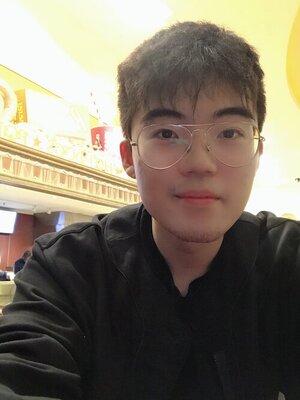
My name is Jingfeng Zhang. I am in my second year of the MSPS program where I co-lead a project in the Learning and Language Laboratory with Professor Jon Willits. We aim to create a simulation of humans in a natural environment, using neural networks built with Unity3d to visualize the learning process. Psychologists use neural network techniques to model the neural changes in the brain that underlie cognition and perception. Our innovative work could allow psychologists and programmers to investigate how the neural networks they develop can learn to make appropriate decisions by using dynamic inputs in a virtual environment.
I began my work with Dr. Willits as an undergraduate research assistant in his Learning and Language Lab. When Dr. Willits learned that I had interests in game development and computer science, he suggested that I could apply these skills to develop simulations of learning processes, such as how people learn to predict what they expect to see in a real-world environment, or how they learn to take an appropriate action. For example, when a person is hungry, they select an apple instead of a glass of water. These seemingly simple cognitions and behaviors represent complex cognitive and biological mechanisms.
Dr. Willits and I decided to create a virtual learning environment consisting of ancestral humans who have neural networks that learn as they make decisions. As we constructed the networks, we tested their functionality. For example, if we set an animal’s hunger level to hungry, it should perform actions that lead to a decrease in hunger, such as picking up an apple and eating it. These tests allowed us to develop neuro-biologically realistic models.
After developing the neural networks, our next goal was to construct a virtual environment. I realized that I could construct it with Unity--the most widely used game development engine in the world. Because I did not have the necessary skills to work with Unity, I spent my summer break and the fall semester of my senior year learning to program in C#. As Dr. Willits had predicted, developing the simulation project allowed me to combine my enthusiasm for game development with my academic interest in deep learning and artificial intelligence. Furthermore, the project enabled me to hone my skills in game development, which is another interest of mine.
At the end of fall semester, Dr. Willits and I successfully constructed a hierarchical system for animals and objects that could exist in our virtual environment. For living elements, such as trees, animals, flowers, and apples, we used a genome—sets of genetic information such as height, color, and weight—to produce a phenotype that allows us to apply certain statistical distributions of physical properties to the “living” animals and objects. In addition to genotypes and phenotypes, our animals have drive systems, sensory systems, motor systems and artificial intelligence. Essentially, they behave just as a real animal would. Finally, I was able to build a recurrent neural network, which allows the processing layer to see its previous output so that the prior decision will shape future decisions. By developing different neural networks and testing them in an artificial, but realistic, environment, we can learn how well the neural network mimics the neurobiology of cognitive processes, such as learning, memory, and language acquisition.
After graduation, I joined the Master of Science in Psychological Science program at Illinois to continue my collaboration with Dr. Willits in the Learning and Language Lab. In addition to continuing the simulation project, I have built upon my statistical skills, including coding with R to better visualize data and using linear algebra to improve my ability to develop artificial intelligence. Furthermore, I have expanded my knowledge in specialized areas that support my research interests. For example, as a member of the Neural Network Modeling lab, led by Professor John Hummel, I am practicing deep nets programming with Python. Finally, as a student in Professor Nan Jiang’s Statistical Reinforcement Learning class, I am deepening my understanding of learning theories.
As a student in the Psychology Department at Illinois, I constantly learn new skills and gain knowledge. I believe that people must challenge themselves to try new things to find out what really interests them and then commit themselves to the process of learning. In the words of Jim Rohn, “motivation is what gets you started, but commitment is what keeps you going.”